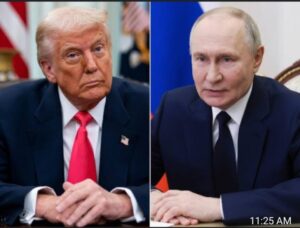Trump Flays Putin Over Escalating Ukraine Attacks, Signals Potential Sanctions

U.S. President Donald Trump has launched a scathing rebuke of Russian President Vladimir Putin following one of the deadliest nights of missile and drone strikes on Ukrainian cities since the start of the war.
In a strongly worded statement, Trump described Putin’s actions as “absolutely CRAZY,” marking a significant shift in tone from his previously more restrained approach to the Russian leader.
The recent Russian barrage, which struck multiple urban centers in Ukraine, resulted in dozens of casualties and widespread infrastructure damage.
Ukrainian officials have called it one of the most intense escalations in months, prompting a wave of international condemnation.
Trump, who is currently leading the Republican field ahead of the 2024 U.S. presidential election, issued a stern warning that if elected, he would consider imposing new sanctions and tariffs on Russia.
He floated the idea of implementing “secondary tariffs” on Russian oil—a measure that would penalize countries doing business with Moscow’s energy sector and further isolate Russia economically.
“If Putin doesn’t come to the table and stop this madness, there will be consequences. These actions are unacceptable. Secondary tariffs are on the table,” Trump said during a rally over the weekend.
Despite his tough stance on Putin, Trump also turned his criticism toward Ukrainian President Volodymyr Zelenskyy.
He accused Zelenskyy of making provocative remarks and suggested the Ukrainian leader is not helping to de-escalate the situation. Trump reiterated his long-standing claim that the war in Ukraine would never have happened under his administration and vowed to broker peace swiftly if returned to office.
The Kremlin has responded to Trump’s comments, saying they see “nothing new” in his threats and remain open to “mutually respectful” dialogue with the U.S., regardless of the political administration in power.
Trump’s statements come at a pivotal moment in global geopolitics, as the war in Ukraine continues to strain international alliances and fuel economic instability.
His remarks suggest a recalibration of his foreign policy approach, potentially influencing not only the trajectory of U.S.-Russia relations but also the broader Western strategy toward Moscow.







